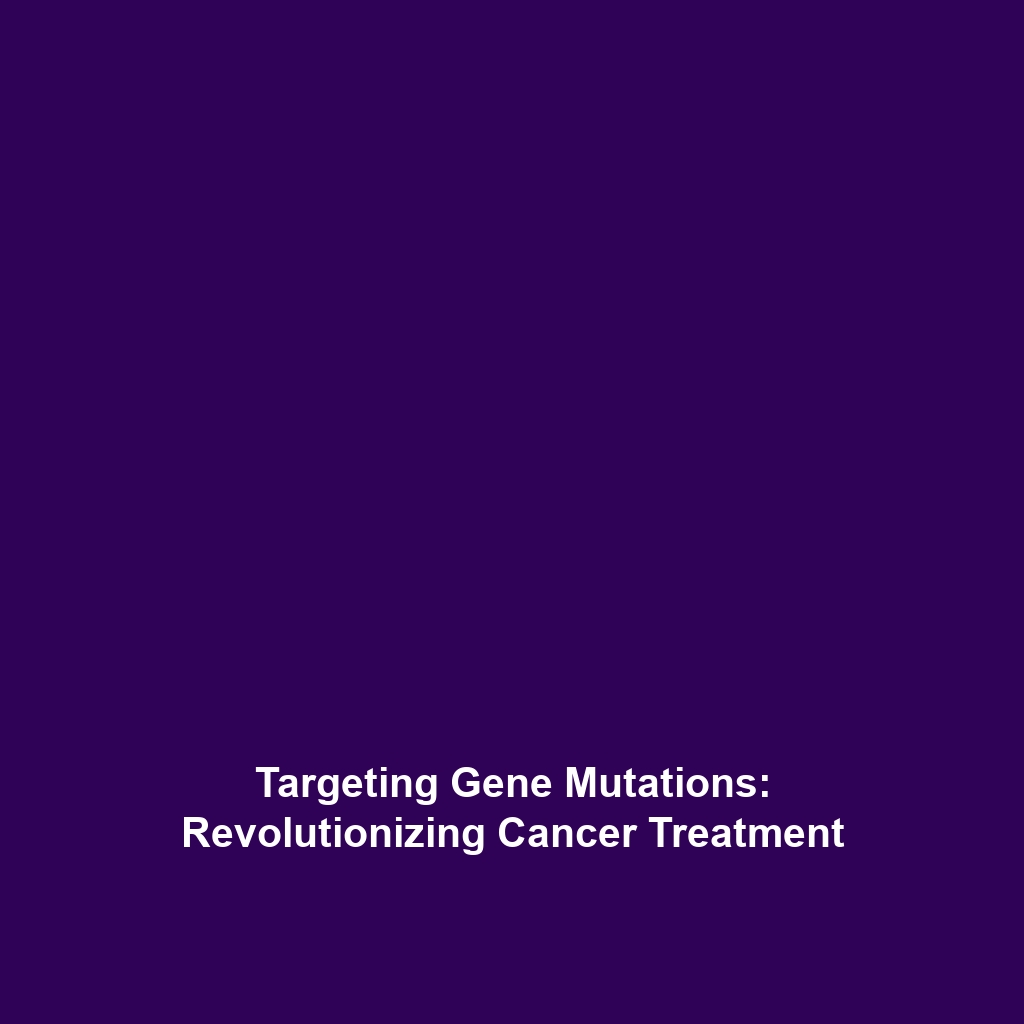Impact of the Human Genome Project on Cancer Treatment: Targeting Gene Mutations
Introduction
The Human Genome Project (HGP), completed in 2003, has profoundly influenced modern medicine, particularly in oncology. One of the most significant advancements has been the development of targeted cancer therapies stemming from a deeper understanding of specific gene mutations, such as the BRCA gene mutations linked to breast cancer. This tailored therapy approach not only enhances treatment efficacy but also minimizes adverse effects, representing a paradigm shift in how cancer is managed. Acknowledging the significance of these targeted therapies can help reshape cancer treatment modalities and improve patient outcomes.
Key Concepts
Understanding Gene Mutations
Gene mutations are alterations in the DNA sequence that can lead to various diseases, including cancer. The HGP has enabled researchers to identify specific mutations that can be targeted with precision therapies. For instance, mutations in the BRCA1 and BRCA2 genes are well-known risk factors for breast and ovarian cancer. Understanding these mutations and their implications is crucial for developing accessible treatment options within the realm of personalized medicine.
Targeted Therapies
Targeted therapies specifically focus on those mutations to inhibit cancer cell growth. Advances from the HGP have facilitated the creation of drugs that specifically act on cancer cells harboring these mutations, improving treatment outcomes and providing hope for patients with inherited cancer syndromes. Keywords such as targeted cancer treatment and gene mutation therapies have become increasingly relevant in oncological discourse.
Applications and Real-World Uses
The impact of the HGP on cancer treatment is evident through various practical applications. Here are some significant examples:
- BRCA Testing: Genetic testing for BRCA mutations helps identify individuals at high risk for breast and ovarian cancer, enabling preventive measures and surveillance strategies.
- PARP Inhibitors: Drugs like Olaparib have been developed to specifically target tumors with BRCA mutations, leading to improved survival rates in patients.
- Personalized Medicine: Tailored treatment plans based on genetic profiles are becoming standard protocol for many oncology practices.
Understanding how targeted therapies work in the context of gene mutations underscores the broader applicability of findings from the Human Genome Project.
Current Challenges
Despite the advancements, the field faces several challenges:
- Testing Accessibility: Many patients lack access to genetic testing, resulting in delays in diagnosis and treatment.
- Understanding Complexities: Not all mutations behave the same way, and the interplay of multiple genetic factors complicates treatment pathways.
- Cost of Treatment: Targeted therapies can be expensive, raising issues about healthcare equity and access.
Addressing these challenges is critical for maximizing the effectiveness of targeted therapies stemming from the Human Genome Project.
Future Research and Innovations
The future of cancer treatment is bright, with several ongoing innovations:
- Next-Generation Sequencing: Advances in genomic sequencing allow for more comprehensive profiling of tumors to tailor treatments better.
- Immunotherapy: This promising approach harnesses the immune system to fight cancer, with ongoing research exploring its synergy with genomics.
- CRISPR Technology: Gene-editing tools like CRISPR are being investigated for their potential to correct mutations and prevent cancer development.
These innovations promise to further enhance the landscape of cancer treatment derived from the findings of the HGP.
Conclusion
The Human Genome Project has fundamentally transformed our understanding of cancer treatment, with targeted therapies now focusing on specific gene mutations like BRCA. This approach has opened new avenues for personalized medicine, enhancing patient care through tailored treatment options. As we continue to address current challenges and explore future innovations, the lessons from the HGP will undoubtedly guide the next stages of cancer therapy. For more detailed insights on genetic mutations and their implications for cancer treatment, consider exploring related topics on our website.
